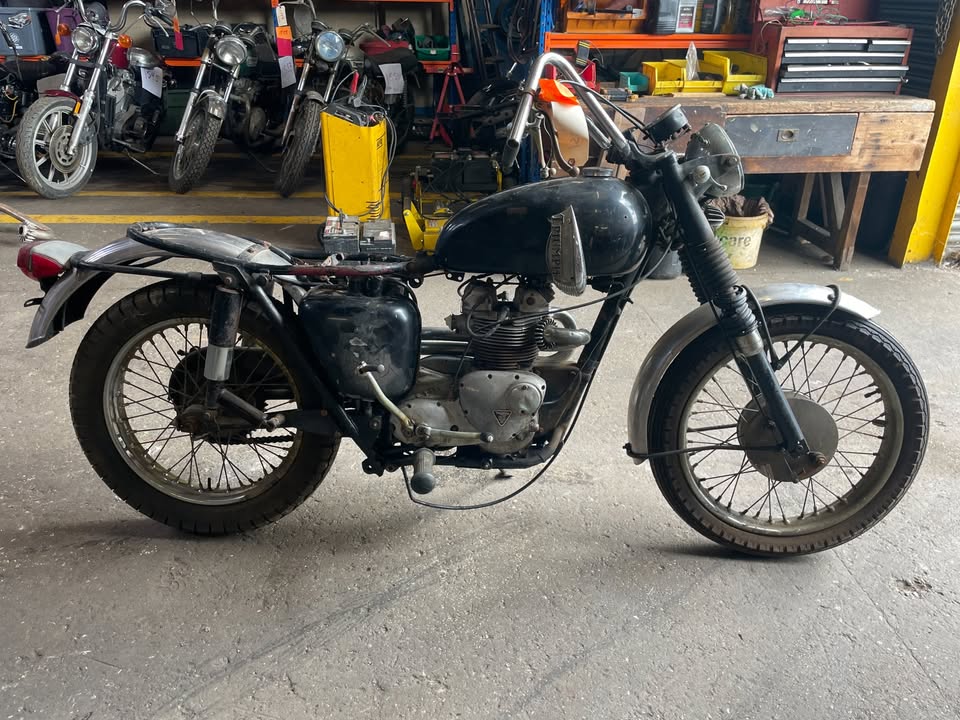Classic and Classy Motorcycles Ltd
Vintage and Classic Motorcycle Importers
1968 Triumph T100C 500cc Tiger Trophy Barn Find Project Ref 1555

1968 Triumph T100C 500cc Tiger Trophy – Lightweight British Scrambler with Proven Versatility
Historical Context
The Triumph T100C Tiger Trophy was part of the storied T100 range that originally debuted in the late 1930s. By 1968, the T100C had evolved into a capable and well-regarded dual-purpose machine. With the rise in popularity of desert racing and off-road motorcycling in the U.S. during the 1960s, Triumph developed scrambler-style variants of their road bikes to meet this demand. The T100C was a high-pipe version of the T100, equipped for light off-road use and sporting Triumph’s proven 500cc parallel twin engine. This made it a favorite among American riders who wanted a nimble, torquey bike for both trails and pavement.
Technical Specifications and Performance
• Year: 1968
• Make: Triumph
• Model: T100C Tiger Trophy
• Engine Displacement: 490cc (marketed as 500cc)
• Engine Type: Air-cooled parallel twin, OHV
• Compression Ratio: 9:1
• Carburetion: Twin Amal Monobloc carburetors
• Ignition System: Points ignition
• Cooling System: Air-cooled
• Fuel Capacity: Approx. 2.5 gallons
• Transmission Type: 4-speed manual
• Braking System: Drum brakes front and rear
• Top Speed: Approx. 90–95 mph
• Dry Weight: Around 340 lbs
Technical Advancements
The T100C featured high-mounted twin exhaust pipes on the left side for increased ground clearance, a common requirement for scrambler-style riding. While still relying on drum brakes and basic suspension, it offered a lightweight frame and responsive handling. The 500cc twin was known for its tractable power delivery and simplicity. For off-road use, Triumph offered optional skid plates and knobby tires, enhancing the bike's dual-sport capabilities without significant modification.
Evolution of the Model
The T100C evolved from earlier 500cc Tigers by incorporating scrambler-specific updates while retaining the core engine and transmission. Over the years, Triumph experimented with various tuning setups and frame tweaks. By 1968, the model was one of the most refined iterations, benefiting from stronger crankshafts, better carburetion, and improved oiling systems. It remained kickstart-only, preserving its classic simplicity and light weight.
Competitors in the Market
The Triumph T100C faced stiff competition from the likes of the BSA Victor 441 and the Matchless G85CS, as well as emerging Japanese dual-sport machines like the Yamaha DT-1. While the Japanese bikes introduced features like oil injection and lighter alloy construction, the T100C retained a loyal following due to its smooth power delivery, robust build quality, and vintage British charm. It offered more refinement and highway comfort than many of its two-stroke rivals, making it a versatile choice.
Legacy and Collectibility
The 1968 T100C is now seen as a classic example of the British scrambler. Its balanced performance and manageable size make it popular with restorers and vintage trail riders alike. Many were modified for competition or customized, so original or barn-find examples are increasingly rare. As a project bike, it offers strong potential—whether restored to factory condition or used as a period-correct off-road build.
Find Classic Motorcycles
Stay in the loop - Subscribe for Updates
One email notification a month when a new shipment arrives.